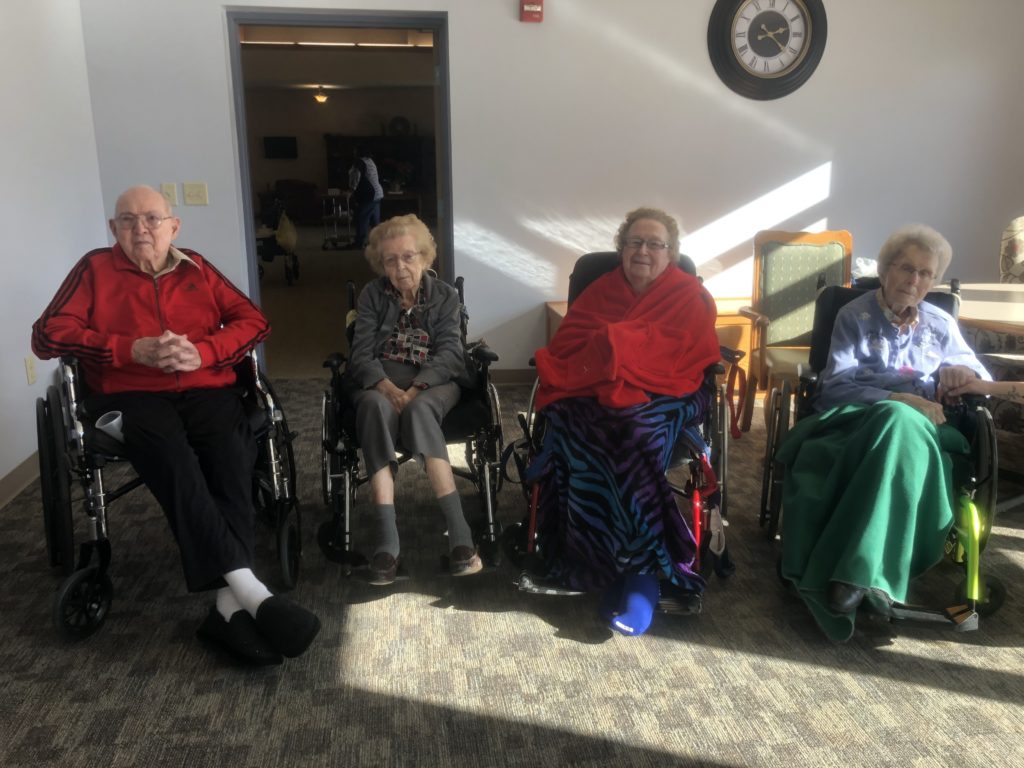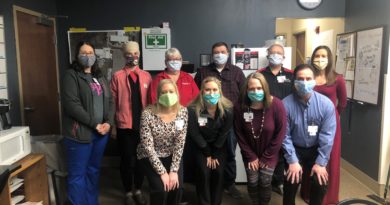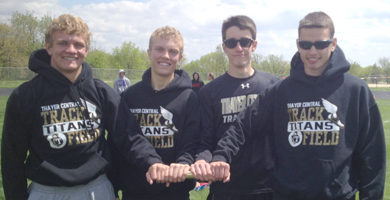Memories span nearly 100 years

Collectively, four residents at Blue Valley Nursing Homes, Dwight Pumphrey, Jean Jacobitz, Martha Denayer and Doris Deepe have 407 years between them, after celebrating their 100th birthdays.
And then there’s Mary Rozmajzl, who was a New Year’s Eve baby 100 years ago, and lives with her sister, Margaret.
Their history is rich, sprinkled with spot memories as Dwight takes himself back to farming potatoes and sugar beets in Scottsbluff County and Doris recalls her family of nine siblings.
Mary rode the Concorde, the supersonic airliner that was double the speed of most, if not all, airliners. She crossed the Atlantic Ocean in about four hours.
All their eyes lit up at the thought and dialogue of their memories. Some have age blocking them from articulating, and others talk non-stop, like Martha, whose grandmother was an opera singer.
“She toured Europe. Her father was an interpreter who knew at least five languages,” Martha’s daughter, Judy Dunn of Belleville, said. “Don’t get her started.”
But Martha was ready to go and talked about hiding to get out of housework and how “very happy” her family was.
Judy prompted Martha’s memory about trips to the zoo in Garden City, Kan., and Martha said she and her siblings were given crackers for a treat on those trips.
Her daughter remembers a home full of music growing up. Judy is the oldest of five children and her mother is a grand to 23 children and has eight great-great grandchildren. Out of the descendants, Judy is the only one who went on to teach public school music.
Jean is from a farm east of Hebron. Three of her four children’s names rhyme, Lonny, Connie and Bonnie. Catherine is her fourth child.
Doris wasn’t fearful when her daughter, Beverly Deepe, went to Vietnam to be a war correspondent.
“I knew she was capable,” Doris said.
After attending Belvidere High School, Doris went to business college and worked for different companies.
She said she couldn’t avoid meeting her husband. They had two children, Beverly and Barbara Joan.
Dwight is a Quilt of Valor recipient. He enlisted in the U.S. Army in 1945 and was stationed in Germany and Africa. He became a 2nd Lieutenant in artillery, and after, worked for the Department of Agriculture.
It is Mary, who will tell listeners about the Great Depression and how her mother would feed the “tramps” at their house on Eads Avenue. Mary lives with her sister, Sister Margaret Nacke.
“Mother always let these people in and did the best we could for them,” Mary said. “We were lucky.”
She’s thankful to have been born in Hebron and returned to Hebron after many years of being in different parts of the United States and abroad.
Mary was baptized at Sacred Heart Catholic Church, and went on to become the salutatorian of Hebron High School for the Class of 1937. She attended Hebron Junior College for a year, and transferred to the Chiliclothe Business College in Missouri.
“It was during the war years and we didn’t really know what women could do,” she said. “I don’t think anyone really knew what was going on in Germany.”
Her mother had relatives in Chicago, who offered to look after Mary if she moved there. Mary did, and worked as a secretary in an insurance company.
She remembers one of her classmates, Pershing Nakada, came to visit her at work. Pershing was Japanese and she said her colleagues were surprised to see him.
He wanted to take Mary to lunch and she was more than fine with it.
“He brought a little makeup case to me as a gift, which I still have today,” she said. By that time, the Japanese had bombed Pearl Harbor, she added.
Later in life, Mary and a friend, Clara Lawson, sailed to England on the Queen Elizabeth II, and saw Scotland and Ireland, and then came home as passengers on the British-French Concorde, probably one of the most remarkable trips of their lives.
According to the company, where she had investments, Mary could fly on the Concorde or receive $750 credit at Harrods, a department store in England.
“They gave each passenger a model of the Concorde on the plane. They told us to watch for the curvature of the Earth,” she said because the Concorde flew higher than 50,000 feet.
She said they could see the speed (Mach) of the plane on one side, and the altitude on the other.
On the plane, she and Clara were served lamb chops for dinner with linen napkins and Cognac to finish the meal.
Mary’s work life included working at air bases in Bruning, and in Colorado Springs, where she and her co-workers lived in a large home. They were served breakfast, but were on their own for supper and she chuckled about the small hot plate they used for cooking.
She also worked for Mutual Insurance of Omaha, where she met her husband, Francis.
“He was an auditor,” she said. “We moved to Malvern, Iowa, and I went to work at the Malvern Trust and Savings Bank.”
Her husband and his father were the owners of a plant for raising chickens in Malvern. When he died, Mary returned to Hebron to help take care of her mother, who was in her 80’s by then.
Mary has a lot to offer in the way of memories and the present.
“Use your mind. Read and keep up with things as much as you can. Take interest in things,” she said.
She thinks cell phones are good and bad.
“It’s a wonderful thing in one way, but it takes from talking to people and imagination,” she said.
She recommends taking advantage of the arts, and recalled the many shows she saw on stage in one of Chicago’s main parks, including a show about a Chinese general.
All five over 100 saw transportation and technology advance through the years.
Martha, one of 11 children, chuckles at the thought of a girl who came to church in a dress after wearing boys’ clothes because it was the Depression. Judy notes the shift from horse to tractor for her mother.
“Once they got a tractor they wanted more land,” Judy said.
Mary said one of the first pieces of furniture she and her husband had in Malvern was a television set.
Free online tools now make it easier than ever to record memories of the elderly, but if someone is still holding onto a 1972 General Electric cassette recorder, it will suffice if a transcript is made.
Regardless of the tools used, scholars agree the histories of seniors should be documented because they’re beneficial in more ways than one. Bonding and realizing family disputes aren’t really that important, are just two more reasons to record histories for generations to come.




